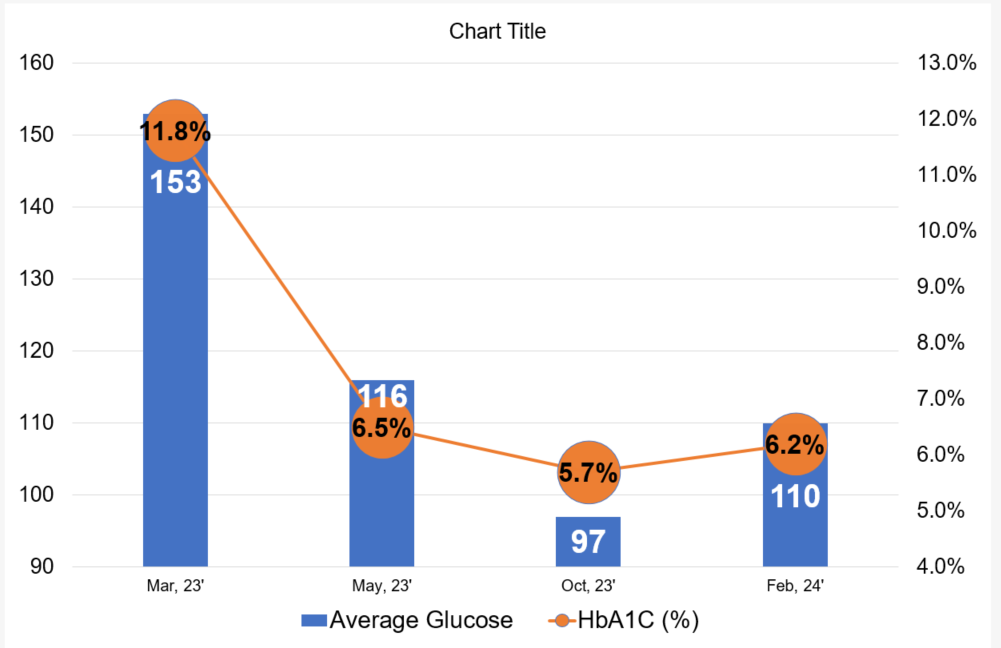Diabetes Screening & Diagnosis
Author: Chhaya Makhija, MD, DipABLM
A board-certified specialist in Endocrinology & Lifestyle Medicine
Welcome to my blog section where I delve into the essentials of diabetes screening and diagnostic criteria established by the American Diabetes Association. As an endocrinologist, I encounter patients grappling with complications stemming from elevated blood glucose levels due to type 2 or type 1 diabetes mellitus. While type 2 diabetes is often attributed to lifestyle factors and is largely preventable, early intervention is key to mitigating complications. My approach emphasizes empowering individuals with education, prevention strategies, continuous glucose monitoring, dietary guidance, and the latest scientific insights.
To aid in this endeavor, I'm pleased to share an exclusive handout designed to benefit our patients and promote proactive healthcare practices. Prediabetes, often overlooked, serves not only as a precursor to diabetes mellitus type 2 but also as a significant cardiovascular risk factor. Our objective is to identify, manage, and prevent prediabetes and diabetes, emphasizing prevention as the cornerstone of our approach. Here is a true patient success story from the many who have benefitted.
POWER OF LIFESTYLE + ENDOCRINE EXPERTISE IN DIABETES CARE:
PATIENT SUCCESS STORY: 50 year old male with type 2 Diabetes x 15 years, From 60 units of insulin in a day —> to no insulin.
From 260 lbs to 202 lbs without injectables.
WHY IS SCREENING IMPORTANT?
California, known as the Sunshine State and the second-largest state in the US, mirrors the global trend of escalating prediabetes and diabetes rates. It's imperative that we address this pressing issue collectively, starting with raising awareness and fostering proactive healthcare behaviors.
HERE IS THE DIAGNOSTIC CRITERIA FOR DIABETES MELLITUS:
During your annual screening exam - ensure to ask for a “Hemoglobin A1C” test. A basic metabolic panel will give one-time fasting glucose value but given that it is a one-time value, it needs to be repeated to confirm a diagnosis. “Hemoglobin A1C” gives an average in the form of a percentage reflecting blood glucose over 3 months, AND YOU DO NOT NEED TO BE FASTING FOR THIS TEST. Certain conditions can cause false elevation or reduction in Hemoglobin A1C values and it is prudent to discuss those with your health care team. I have a list of conditions that I review with patients if there is a discrepancy in the values reported.
How do I approach Diabetes in my Direct Endocrine Care practice:
Expertise - ongoing, frequent education, support and monitoring.
Access - to the expert physician (in-person, telemedicine, emails, text messages).
Time - frequent visits (in-person, telemedicine, emails, text messages).
Navigating diabetes care can be complex, yet with access to specialized expertise, continual support, and cutting-edge tools such as diabetes technology and continuous glucose monitors the journey toward optimal health becomes more manageable. Investing time in meaningful interactions with your healthcare team, including physicians, endocrinologists, and other allied health professionals, plays a pivotal role in optimizing treatment outcomes and enhancing overall well-being.
Visit us in the East Bay
Our medical office is conveniently located in Lafayette, California, a beautiful and serene suburb in the East Bay. Known for its scenic Lafayette Reservoir, top-rated schools, and charming downtown with boutique cafes and restaurants, Lafayette offers a peaceful escape from the hustle of the Bay Area—making it the perfect setting to reset your health.
Just a short drive away, Walnut Creek combines natural beauty with vibrant city life. Home to world-class shopping, excellent dining, and the expansive open spaces of Mount Diablo State Park, Walnut Creek also serves as a major healthcare and business hub for professionals in Contra Costa County.
Whether you're in San Francisco, Oakland, Berkeley, Palo Alto, Fremont, Walnut Creek, Pleasanton, Danville, or Menlo Park — accessing world-class medical care has never been easier.
We offer in-person visits at our Lafayette office and telemedicine appointments throughout California.
Schedule Your Diabetes Care in Lafayette, CA or Near Walnut Creek




